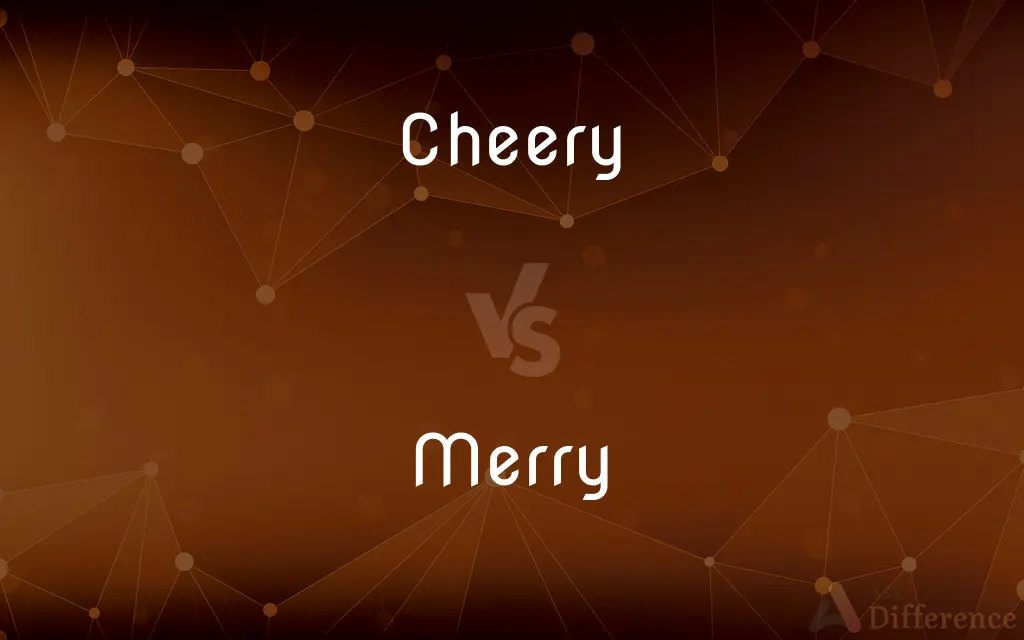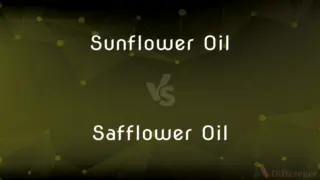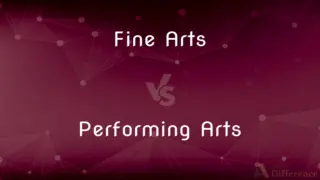Cheery vs. Merry — What's the Difference?
Edited by Tayyaba Rehman — By Fiza Rafique — Published on November 15, 2023
"Cheery" describes a bright and optimistic disposition, while "Merry" refers to joyful and festive spirits. While both indicate happiness, "Cheery" leans more towards light-heartedness, and "Merry" suggests celebration.

Difference Between Cheery and Merry
Table of Contents
ADVERTISEMENT
Key Differences
"Cheery" and "Merry" are both adjectives in the English language that convey positive feelings and emotions. "Cheery" often describes something or someone radiating happiness, brightness, or optimism. When someone greets you with a cheery hello, it's infused with enthusiasm and warmth. In contrast, "Merry" is more aligned with festivity, jubilation, and often used in the context of celebrations. A merry crowd at a festival would indicate their joyful participation and exuberance.
A cheery room, characterized by bright colors and light, brings forth feelings of comfort and optimism. It doesn't necessarily imply a celebratory atmosphere. On the other hand, a merry gathering indicates more than just optimism; it suggests an active celebration or festive occasion, like a birthday or holiday gathering where attendees are in high spirits.
While "Cheery" often pertains to moods or atmospheres, pointing to general positivity and brightness, "Merry" leans toward moments of active joy and celebration. For instance, one can have a cheery disposition in daily life, reflecting a generally optimistic outlook. However, wishing someone a "Merry Christmas" is hoping they have a festive, joyful celebration of the holiday.
In essence, while there's an overlap in the sentiments they convey, the context and depth of happiness they describe can differ. "Cheery" is about bright and optimistic feelings, while "Merry" emphasizes joyous celebration and festivity.
Comparison Chart
Basic Meaning
Bright and optimistic
Joyful and festive
ADVERTISEMENT
Emphasis
General positivity and brightness
Active joy and celebration
Common Usage
Describes moods or atmospheres
Often linked with occasions or celebrations
Tone
Light-heartedness
Jubilation
Contextual Examples
Cheery smile, cheery demeanor
Merry gathering, Merry Christmas
Compare with Definitions
Cheery
Radiating happiness and optimism.
Her cheery smile brightened up the room.
Merry
Full of joy and high spirits.
They sang merry songs around the campfire.
Cheery
Encouraging or uplifting.
She gave a cheery pep talk to the team.
Merry
Producing or inspiring joy.
The merry tunes of the band had everyone dancing.
Cheery
Indicative of good spirits.
He always had a cheery attitude, even during tough times.
Merry
Full of cheerfulness, liveliness, and good feelings
Merry revelers.
Cheery
Characterized by cheerfulness.
His cheery demeanor was infectious.
Merry
Marked by or offering fun, good feelings, and liveliness; festive
A merry evening.
Cheery
Bright and pleasant.
The cheery wallpaper made the room feel welcoming.
Merry
Brisk
A merry pace.
Cheery
Showing or suggesting good spirits; cheerful
A cheery hello.
Merry
(Archaic) Delightful or pleasing.
Cheery
In a good mood, happy, cheerful.
Merry
Jolly and full of high spirits; happy.
We had a very merry Christmas.
Cheery
Displaying evident cheerfulness; cheerful; lively; gay; bright; pleasant; as, a cheery person; a cheery hello.
His cheery little study, where the sunshine glimmered so pleasantly.
Merry
Festive and full of fun and laughter.
Everyone was merry at the party.
Cheery
Bright and pleasant; promoting a feeling of cheer;
A cheery hello
A gay sunny room
A sunny smile
Merry
Brisk
The play moved along at a merry pace.
The car moved at a merry clip.
Merry
Causing laughter, mirth, gladness, or delight.
A merry jest
Merry
(euphemistic) drunk; tipsy
Some of us got a little merry at the office Christmas party.
Merry
An English wild cherry.
Merry
Laughingly gay; overflowing with good humor and good spirits; jovial; inclined to laughter or play; sportive.
They drank, and were merry with him.
I am never merry when I hear sweet music.
Merry
Cheerful; joyous; not sad; happy.
Is any merry? let him sing psalms.
Merry
Causing laughter, mirth, gladness, or delight; as, a merry jest.
His merie men commanded heTo make him bothe game and glee.
Merry
A kind of wild red cherry.
Merry
Full of or showing high-spirited merriment;
When hearts were young and gay
A poet could not but be gay, in such a jocund company
The jolly crowd at the reunion
Jolly old Saint Nick
A jovial old gentleman
Have a merry Christmas
Peals of merry laughter
A mirthful laugh
Merry
Offering fun and gaiety;
A gala ball after the inauguration
A festive (or festal) occasion
Gay and exciting night life
A merry evening
Merry
Quick and energetic;
A brisk walk in the park
A lively gait
A merry chase
Traveling at a rattling rate
A snappy pace
A spanking breeze
Merry
Indicative of celebration or festivity.
Wishing you a Merry Christmas!
Merry
Lively and cheerful.
The merry laughter of children echoed in the park.
Merry
Marked by joyousness or gaiety.
The town had a merry atmosphere during the festival.
Common Curiosities
Are "Cheery" and "Merry" interchangeable?
While both indicate happiness, "Cheery" leans towards optimism, and "Merry" suggests festivity.
Is "Merry" synonymous with "Happy"?
They're close in meaning, but "Merry" often has celebratory or festive connotations.
Can a greeting be cheery?
Yes, a greeting given with enthusiasm and warmth can be termed cheery.
Can "Merry" describe someone's nature?
Yes, someone who's often in high spirits can be said to have a merry nature.
Is "Merry-go-round" related to the word "Merry"?
Yes, it suggests the joy and fun associated with the carousel ride.
Can you describe a person as cheery?
Yes, a person with a bright and optimistic demeanor can be described as cheery.
Is "Merry" used only for occasions?
While commonly associated with occasions, "Merry" can describe any joyous state or situation.
Can a song be cheery?
Absolutely! A song with an uplifting and bright melody can be described as cheery.
Can weather be described as cheery?
Typically, it's the effect of the weather, like a "cheery sunny day," implying a mood lift from the sunshine.
Why do we say "Merry Christmas" and not "Cheery Christmas"?
"Merry Christmas" is a traditional greeting emphasizing the joy and celebration of the holiday.
Can an event be merry?
Yes, if the event is characterized by joy, celebration, and high spirits, it can be termed merry.
Does a "Cheery" color imply brightness?
Typically, yes. A cheery color would be one that is bright and uplifting.
Can a joke be merry?
Yes, a joke causing laughter and joy can be termed a merry joke.
Does "Cheery" always indicate happiness?
Mostly, it indicates brightness, optimism, or a positive disposition, which often relates to happiness.
Is "Cheery" used more in specific contexts?
"Cheery" is versatile but often used to describe moods, atmospheres, or things inducing positivity.
Share Your Discovery

Previous Comparison
Sunflower Oil vs. Safflower Oil
Next Comparison
Fine Arts vs. Performing ArtsAuthor Spotlight
Written by
Fiza RafiqueFiza Rafique is a skilled content writer at AskDifference.com, where she meticulously refines and enhances written pieces. Drawing from her vast editorial expertise, Fiza ensures clarity, accuracy, and precision in every article. Passionate about language, she continually seeks to elevate the quality of content for readers worldwide.
Edited by
Tayyaba RehmanTayyaba Rehman is a distinguished writer, currently serving as a primary contributor to askdifference.com. As a researcher in semantics and etymology, Tayyaba's passion for the complexity of languages and their distinctions has found a perfect home on the platform. Tayyaba delves into the intricacies of language, distinguishing between commonly confused words and phrases, thereby providing clarity for readers worldwide.













































